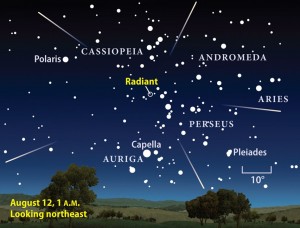
Perseid meteor shower, Stellafane Observatory, Springfield, Vermont, August 7, 2010. Photo credit: Dennis di Cicco, Sky & Telescope
At the risk of angering everyone I know, I’m going to admit that I’m suffering from a surfeit of Curiosity. I’ll be waiting up Sunday night for the MSL landing, but in the meantime, I’m not sure I can absorb much more information about the mission. So, instead of talking more about current events, I’m going to daydream about the future.
If all goes well (meaning: if my friend responds appropriately to the gentle pressure I will be putting on her next week and if the weather cooperates), we will be going out to Paynetown for the Perseid Meteor Party. The timing is perfect: it’s a Saturday night, so we can sleep in a bit the next morning, and the moon will be on the wane, so its light won’t interfere with show.
The Perseid meteors, which are actually debris from the tail of Comet Swift-Tuttle, emanate from the constellation Perseus. If you’re not super familiar with the sky, you may not be familiar with that particular constellation. That’s okay. Look instead for Cassiopeia (you know, the one that looks like a W). The shower’s radiant point will be between the W and the horizon.
Although it’s not impossible to see Perseids from the southern hemisphere, they’re much more visible from the northern. Those of you in Canada may have already noticed an increased number of meteors in the late night sky. That number will only increase over the next week, so keep looking up. No telescope needed, just your naked eye!
ETA: Need some meteor-watching advice? Check Meteorwatch’s page on the Perseid Meteor Shower.
Those of you who arrived at this page while looking for information about the Goldendale Observatory will be glad to know that the observatory is hosting a meteor watch on August 11 beginning at 11:00 p.m. (after the regularly scheduled skywatching session), running until 4:00 a.m. LIGO Hanford is also hosting a meteor-watching event on August 11 from 8:00 p.m. to 1:00 a.m.
